Iranian Media Report Electronic Warfare Exercise To Counter Drones
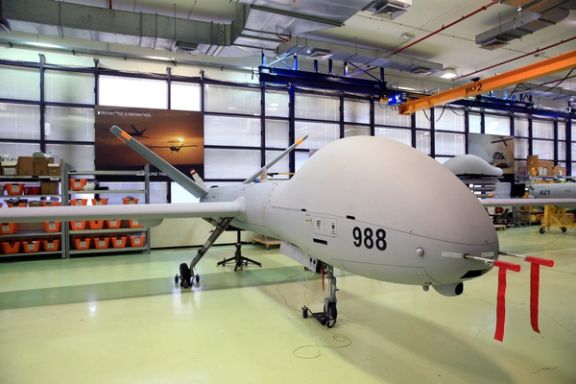
Iranian media have announced the commencement of an electronic warfare exercise held within the country's central regions to counter drone attacks.

Iranian media have announced the commencement of an electronic warfare exercise held within the country's central regions to counter drone attacks.
According to a report by local media on Friday, the joint electronic warfare exercise was initiated by the Islamic Republic Army. The exercise involves practical evaluation and training of various stationary, mobile, ground-based, and aerial electronic warfare systems.
Units from the Navy, Ground Forces, Air Force, as well as air defense participated in this exercise, which took place primarily in a desert region.
The IRIB news agency wrote, "Electronic defense systems stationed in the exercise area successfully executed non-lethal defense operations and electronic protection against unmanned aerial vehicles and small attacking drones."
A day before this exercise, Habibollah Sayyari, the Deputy Coordinator of the Army, stated, "Given the importance of electronic warfare in today's battles and its significant role in future conflicts, special attention to electronic warfare technologies… have been on the agenda of the Islamic Republic of Iran Army in recent years."
This exercise takes place at a time when Iran's nuclear sites located in central areas of the country have been targeted by drone attacks in the past years.
In February, The Wall Street Journal, in an exclusive report quoting American officials and individuals, attributed a drone attack on a defense ministry complex in Esfahan to Israel.
While the Islamic Republic has been supplying drones to Russia for use in attacks on Ukraine, the spokesperson of the Ukrainian Air Force also declared at that time that the drone attack on military installations in Esfahan was a consequence of the policies of the Islamic Republic.
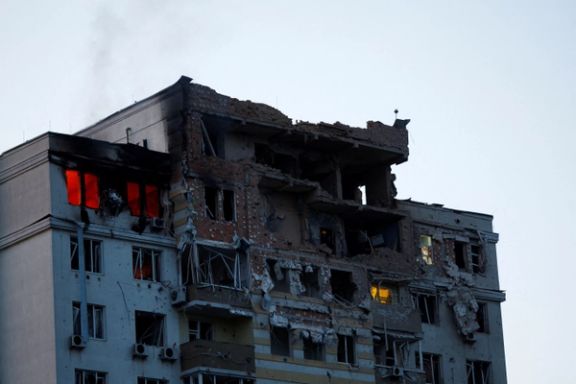
Russia's military cooperation with Iran will not succumb to geopolitical pressure, Russian Deputy Foreign Minister Sergei Ryabkov said, referring to pressure from the United States.
Washington has been publicly demanding that Iran should stop providing military drones to Russia and scale down its bilateral military cooperation.
"There are no changes, and cooperation with Iran will continue," Ryabkov said, according to a report on Saturday from Russian state news agency RIA. "We are independent states and do not succumb to the dictates of the United States and its satellites."
The US is pressing Iran to stop selling the armed drones, which Russia is using in the war in Ukraine, the Financial Times reported earlier this month, citing an Iranian official and another person familiar with the talks.
Russia began using the Iranian-made Shahed drones to attack deep inside Ukraine last year. The so-called kamikaze unmanned drones do not need a runway to launch and explode on impact. Ukraine has learned to shoot down most of the unmanned aerial vehicles but Russia has been using them in conjunction with ballistic and cruise missiles to overwhelm Ukraine’s air defenses.
Iran has acknowledged sending drones to Russia but said in the past they were sent before Russia's February 2022 invasion in Ukraine. Moscow has denied its forces used Iranian drones in Ukraine.
However, Russia has used hundreds of the Iranian drones and Ukraine has reported regular deliveries reaching Russia.
A White House official said in June that Iran had transferred several hundred drones to Russia since August 2022.
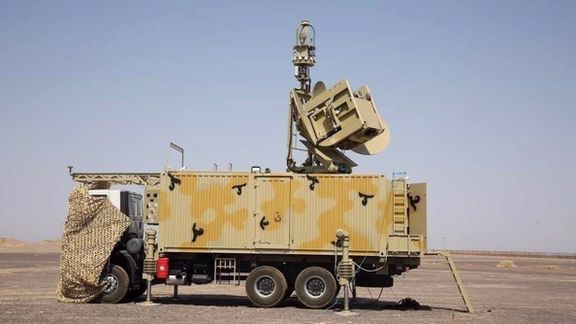
Iran on Friday launched exercises to test its “electronic warfare” capabilities against mock enemy drones, fighter jets and helicopters.
The electronic warfare drills -- codenamed Separ-e Hafezan-e Velayat 1402 (Shield of Velayat's Guardians 1402) -- involved various units from the military's navy, ground and air forces as well as air defenses and was staged in the central, largely desert region of the country.
The state broadcaster said that the exercises featured domestically manufactured radars, drones, manned and unmanned fighter jets, micro aerial vehicles and other military equipment as the country seeks to assess the performance and effectiveness of various fixed, mobile, ground-based and airborne electronic warfare systems.
“The army has the appropriate infrastructure, and we have achieved favorable results in countering threats in today’s world and predicting future threats in this sensitive and complicated arena,” said Rear Admiral Habibollah Sayyari, the deputy chief of the army’s coordination department.
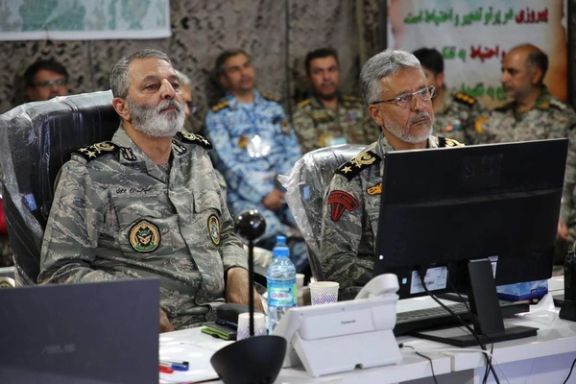
According to Friday's statement by the Army, various tactics and operations have been carried out during the drill, including identifying radio and data link communications, execution of group attack operations by micro aerial vehicles (MAVs) against targets, electronic operations to protect radars, and ground-based electronic operations to disrupt and deceive enemy radar systems.
Iran has recently unveiled a series of what it called new maritime weapons and an upgraded drone earlier this month as Washington appeared to be increasing pressure on Tehran.
Earlier in the month, the Biden administration signaled that it may soon offer to put armed sailors and Marines on commercial ships traveling through the Strait of Hormuz.
The Pentagon last month had already sent additional F-35 and F-16 fighter jets along with a warship to the Middle East in a bid to monitor key waterways in the region following Iran's seizure and harassment of commercial vessels.
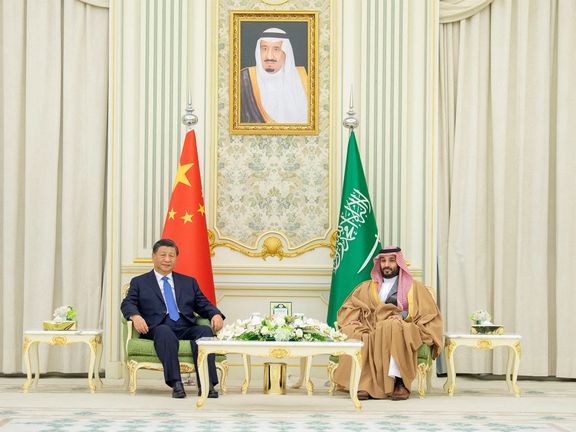
As Saudi Arabia continues to pursue an ambitious nuclear program, it has turned to China to pressure Washington as US talks stall.
The Kingdom’s bid to reach parity with Iran, in spite of revived diplomatic relations this year, is driving the Persian Gulf’s oil powerhouse to reach out to China, according to the Wall Street Journal.
Saudi Arabia has asked the US to help it develop a civilian nuclear program as part of a potential deal that would include diplomatic normalization with Israel, which Riyadh doesn’t recognize. Saudi Arabia is also asking the US to provide security guarantees for the kingdom as part of such a deal.
It is causing dilemmas for the United States, which is walking a tightrope in the region, with continuing tensions with Iran and an ever-hungrier Saudi Arabia seeking uranium enrichment on its home soil.
Bypassing the US in favor of China, which earlier this year was a major part of the negotiations to reinstate diplomatic relations between Iran and Saudi, is a firm statement that with or without President Joe Biden’s agreement, Riyadh will do all it can to forge its way into the nuclear domain.
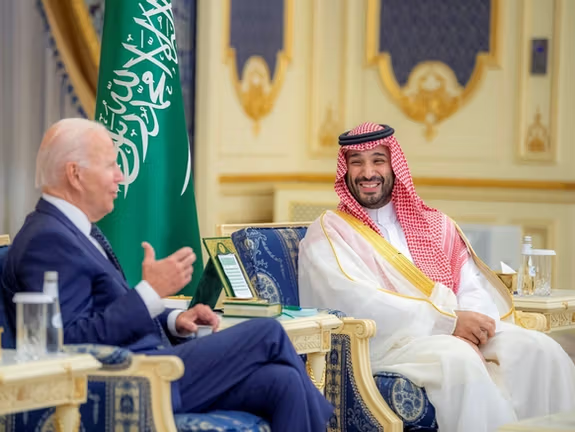
According to Israel’s Haaretz, leading American and Israeli experts are warning the Biden administration not to accept Saudi demands for uranium enrichment as part of a future US-Saudi-Israeli normalization agreement, for fear it will build its own nuclear weapons.
The fears emerged after Israel’s Strategic Affairs Minister Ron Dermer did not rule out Saudi uranium enrichment during an interview with PBS. He argued the Saudis could go to China or France to set up a native nuclear enrichment program, suggesting it would be better to have the US, Israel’s most important ally, involved.
A Saudi-Israel deal, alongside the shadow war with Iran, is atop Israeli Prime Minister Benjamin Netanyahu’s agenda, and many in Israel fear he will reach it at any cost as he approaches the end of his decades-long political career.
Opposition leader Yair Lapid said this week: “It is clear to everyone that if they [Saudi] start enriching uranium in the Middle East, everyone will want to."
Until now, the US has said American nuclear aid is contingent on the Saudis agreeing to not enrich their own uranium or mine their own uranium deposits in the kingdom—non-proliferation conditions not sought by China, which has been seeking to strengthen its influence in the Middle East.
China National Nuclear Corp., a state-owned company known as CNNC, has bid to build a nuclear plant in Saudi Arabia’s Eastern Province, near the border with Qatar and the United Arab Emirates, according to the WSJ, which claims the dealings with China are a pressure tactic on Washington as the two nations drifted further apart since the Biden administration came to power.
Biden promised to make Saudi a ‘pariah state’ after the brutal assassination of US-Saudi journalist Jamal Khashoggi, which has caused years of tension between Biden and Saudi’s de facto ruler, Crown Prince Mohammed Bin Salman.
Crown Prince Mohammed Bin Salman has made obtaining nuclear power a priority. After a decade of discussions, the Saudis are now impatiently pushing to award a contract for the Eastern Province plant, known as Duwaiheen—a two-reactor, 2.8-gigawatt facility—by the end of 2023 and eventually construct 16 reactors at a cost of some $80 billion to $100 billion.
Driven by the desire for parity with Iran in addition to looking towards a time when the kingdom’s main export, oil, is no longer a viable revenue source and nuclear power would offer a viable alternative, time is now ticking. MBS has made no secret of his willingness to develop nuclear weapons if Iran does.
China has already helped Riyadh build its own ballistic missiles and helped the Saudis with a facility for extracting uranium yellowcake from uranium ore, an initial step toward enriching uranium.
There is no doubt that Saudi Crown Prince has his eye on being the region’s political powerhouse, a fact which has more recently created tensions with the UAE’s President and MBS’s initial mentor on his rise to power, Mohammed Bin Zayed.
Close allies of the US such as the UAE and South Korea have accepted stronger restrictions on their nuclear programs and will see US support for enrichment on Saudi soil as a justification to demand the same.
Where the Israeli factor plays into the next stages of the race to nuclear is yet to be seen, the Prime Minister’s office claiming hours after Dermer’s comments that it will not allow any of its neighbors to develop nuclear weapons, but there seems no doubt that Saudi Arabia will get its way, whatever the cost.
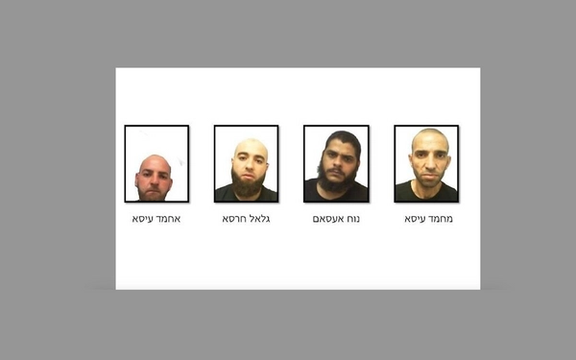
Israel’s Shin Bet security agency says it arrested four Arab-Israelis in July on charges of smuggling Iranian-made explosive devices into the country and ties to Hezbollah.
According to Shin Bet, three individuals from the northern Arab town of Kafr Qasim were arrested on suspicion of smuggling "a substantial quantity of high-quality weapons" into Israel. The agency added that, during their arrest, they seized two Iranian-made explosive devices along with other weapons.
In a separate raid in the central city of Lod, security forces detained another Israeli who was allegedly planning to use a similar explosive device for a criminal-related bombing.
“The Shin Bet investigation revealed that Hezbollah worked to recruit and operate an infrastructure of smugglers in Israel for the purpose of distributing unusual illegal weapons to various parties, including criminal elements,” the agency said in a statement.
The Shin Bet identified the suspects as Jalal Khursa, 28, Ahmed Issa, 30, and Muhammed Issa, 39, from Kafr Qasim, and Nuh Assam, 30, from Lod. They were indicted Wednesday on various weapons offenses, making the agency publicize details of the investigation.
“This affair once again illustrates the efforts of terror elements from Hezbollah and Iran to exploit the Arab citizens of Israel for [terror] activities against the state,” a senior Shin Bet official said, adding, “It also emerged in the investigation that the line between [terror] and criminal [activity] is extremely thin.”
Hezbollah has been accused in the past of being involved in weapons and drug smuggling attempts. Most illegal guns in Israel and the West Bank are thought to have been smuggled via Jordan, with far fewer attempts from Lebanon. In late July, the military foiled a weapons smuggling attempt from Jordan.
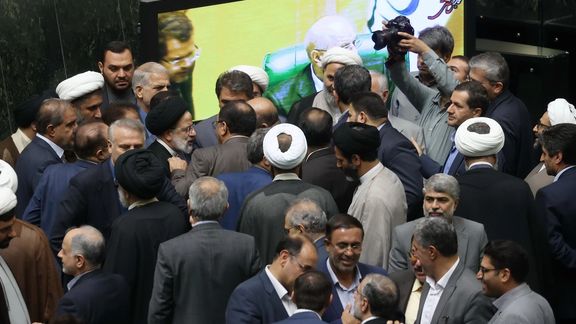
Iranian and regional media continue to assess President Ebrahim Raisi's performance as he enters the third year of his presidency.
Tehran's Khabar Online website quoted lawmaker Gholam Ali Jafazadeh Imanabadi on Tuesday, who stated that Raisi's track record over the past two years is characterized by failure. Imanabadi emphasized that Raisi should either step down or refrain from seeking a second term.
Imanabadi pointed out that Raisi has been unable to address unemployment, poverty, social tensions, and various other issues impacting the nation's welfare during the past two years. He further noted that Raisi's track record lacks any positive points and accused him of resisting the rule of law within the country.
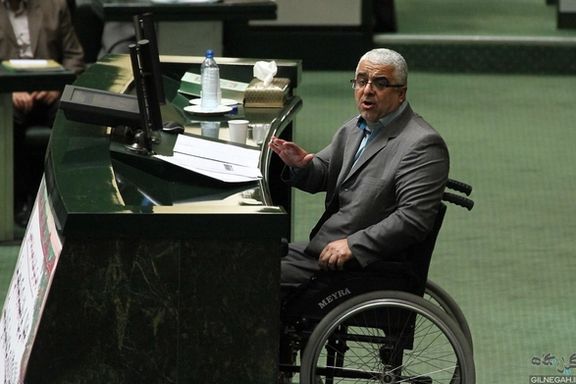
Former Presidential candidate Mostafa Hashemitaba echoed Imanabadi's sentiments about Raisi's weaknesses. Hashemitaba told Khabar Online that the government is failing to convey the truth to the nation regarding the dire economic situation. He also accused Raisi of dismissing suggestions made by well-wishers.
Similar to other critics, including prominent clerics Raisi met on the anniversary of his government, Hashemitaba also highlighted Raisi's failure to fulfil promises made to the nation during the 2021 presidential elections. He further criticized Raisi's administration for lacking effective solutions to the nation's problems.
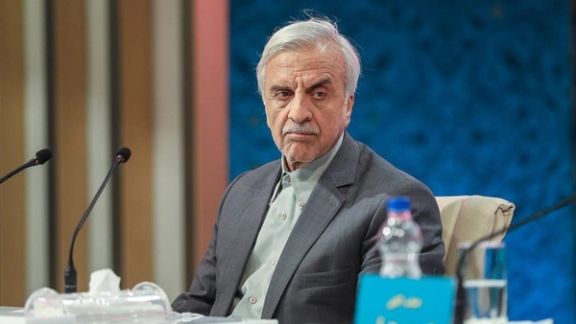
Academic Bijan Abdolkarimi, speaking to the Rouydad24 website, commented that the Iranian government is generally influenced by hardliners it cannot control. While trying to be fair to Raisi's government, Abdolkarimi noted that the radicals within the government are responsible for the nation's issues, rather than general mismanagement.
Abdolkarimi added that hardliner infiltrators and radicals within the government have caused significant harm, but the public is overwhelmed with various problems, making them less aware of these individuals. He also claimed that the radicals perceive no obstacles to their destructive activities, highlighting a dangerous divide between the government and the people.
Warning of a destabilizing gap between the government and the people, Abdolkarimi called for swift solutions to this issue. He stated, "Financial problems have deprived the nation of peace of mind. Given this circumstance, the government should prioritize the people's livelihood over issues like hijab. Iranians are grappling with unprecedented inflation, and naturally, their concern for issues like hijab is diminished."
Regarding hijab regulations, Abdolkarimi noted, "When a segment of society disagrees with a law, it signifies a lack of legitimacy for that law, and the government should not insist on enforcing it."
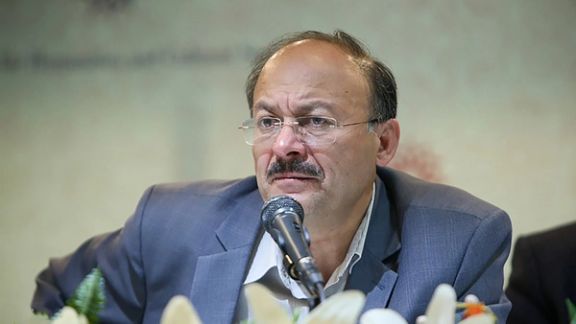
On August 17, the Hebrew website Walla referred to research conducted by the IDF Intelligence Division. It suggested that there is a growing belief among Western intelligence sources that Raisi's chances of succeeding the 83-year-old ruler Ali Khamenei are high.
While the idea of Raisi's succession has weakened due to his performance in the past two years, some Iranian analysts, like Mehdi Mahdavi Azad, believe he could potentially be an ideal supreme leader under a despotic military regime after Khamenei's death.
Walla's analysis states, "Two years into Ibrahim Raisi's tenure, Iran's economy is in a deep crisis, the hijab protests may resurge, but there have also been political achievements. Israel's assessment of Raisi's character describes him as 'one of the least qualified for his position,' and continues: 'Raisi broadcasts something weak and much less dominant than his predecessors.'"






